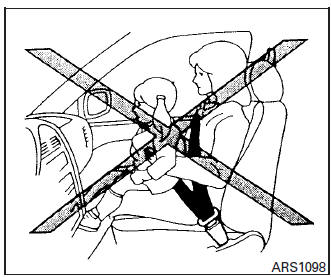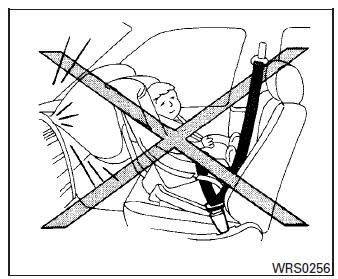Nissan Rogue Owners Manual: Precautions on child restraints


WARNING
|
| CAUTION A child restraint in a closed vehicle can become very hot. Check the seating surface and buckles before placing a child in the child restraint. |
This vehicle is equipped with a universal child restraint anchor system, referred to as the LATCH (Lower Anchors and Tethers for CHildren) system.
Some child restraints include rigid or webbing-mounted attachments that can be connected to these anchors. For additional information, refer to ŌĆ£LATCH (Lower Anchors and Tethers for CHildren) systemŌĆØ in this section.
If you do not have a LATCH compatible child restraint, the vehicle seat belts can be used.
Several manufacturers offer child restraints for infants and children of various sizes. When selecting any child restraint, keep the following points in mind:
- Choose only a restraint with a label certifying that it complies with Federal Motor Vehicle Safety Standard 213 or Canadian Motor Vehicle Safety Standard 213.
- Check the child restraint in your vehicle to be sure it is compatible with the vehicleŌĆÖs seat and seat belt system.
- If the child restraint is compatible with your
vehicle, place your child in the child restraint
and check the various adjustments to be
sure the child restraint is compatible with
your child. Choose a child restraint that is
designed for your childŌĆÖs height and weight.
Always follow all recommended procedures.
- If the combined weight of the child and child restraint is less than 65 lbs (29.5 kg), you may use either the LATCH anchors or the seat belt to install the child restraint (not both at the same time).
- If the combined weight of the child and child restraint is greater than 65 lbs (29.5 kg), use the vehicleŌĆÖs seat belt (not the lower anchors) to install the child restraint.
- Be sure to follow the child restraint manufacturerŌĆÖs instructions for installation.
All U.S. states and Canadian provinces or territories require that infants and small children be restrained in an approved child restraint at all times while the vehicle is being operated. Canadian law requires the top tether strap on forward-facing child restraints be secured to the designated anchor point on the vehicle.
 Child restraints
Child restraints
...
 LATCH (Lower Anchors and Tethers for CHildren) System
LATCH (Lower Anchors and Tethers for CHildren) System
LATCH system lower anchor locations - bench seat
Your vehicle is equipped with special anchor
points that are used with LATCH system compatible
child restraints. This system may also be
referr ...
Other materials:
Disassembly and assembly
FUEL LEVEL SENSOR UNIT
Exploded View
Fuel Level Sensor Unit
Fuel filter and pump assembly
Fuel level sensor unit
Float arm assembly
Fuel tank temperature sensor
Disassembly and Assembly
NOTE:
Fuel level sensor unit and fuel tank temperature sensor are replaced as and
assembl ...
Tire labeling
Example
Federal law requires tire manufacturers to
place standardized information on the
sidewall of all tires. This information identifies
and describes the fundamental
characteristics of the tire and also provides
the tire identification number (TIN)
for safety standard certification. The ...
U1111 lost communication (chassis control module)
DTC Description
DTC DETECTION LOGIC
DTC
CONSULT screen terms
(Trouble diagnosis content)
DTC detection condition
U1111
LOST COMM (CHASSIS CONT MDUL)
(Lost Communication With Chassis Control
Module)
When the ignition switch is ON, TCM is unable to receive the CA ...
